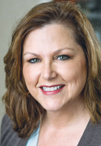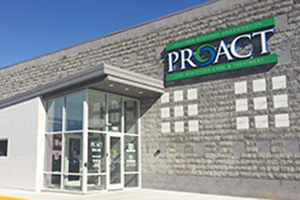By KEN LEISER
During the past five years, the opioid epidemic was no longer just banging at the door of Huntington, W.Va. It had crashed right through it.
West Virginia had the highest rate of opioid-related overdose deaths in the country in 2016 — a year that included 26 reported nonfatal overdoses on the same day in Huntington, a city with a population of 47,100. In Cabell County, which is where Huntington is located, there were 1,831 overdoses and 183 overdose deaths in 2017 alone. The county is home to 95,000 people.

Creasy
"We were literally watching people die around us," recalled Robin Creasy, director of patient experience at St. Mary's Medical Center in Huntington. "Every day, the paper revealed the deaths of our kids and mothers and brothers and aunts and uncles."
In response to Huntington's ignominious place at the front lines of the national opioid crisis — explored in the 2017 Oscar-nominated short documentary, Heroin(e) — St. Mary's and other health providers including competitors came together to mount a patient-centered response.
In October 2018, they opened a freestanding specialty clinic called the Provider Response Organization for Addiction Care & Treatment facility, or PROACT for short, in a retail space that used to be a CVS Pharmacy.
To launch the venture, St. Mary's joined with Cabell Huntington Hospital, which acquired St. Mary's in April 2018. Other partners include Valley Health, a system of community health centers; Thomas Health System, which operates Saint Francis Hospital in Charleston, W.Va.; and Marshall Health, the faculty practice of Marshall University Joan C. Edwards School of Medicine in Huntington.
Clearinghouse
The center is a one-stop shop where people with substance use disorder can be evaluated and receive treatment for their dependence on opioids and/or other drugs including alcohol. Some patients are referred to other locations for treatment.

The PROACT facility is housed in a retail space that used to be a CVS Pharmacy in Huntington, W.Va.
The facility functions as a clearinghouse to ensure people with substance use disorders have ready access to a menu of services both at the facility and in the greater community.
Services available at the outpatient facility include medical and mental health assessment, medicine-assisted treatment utilizing Suboxone and Vivitrol to reduce opioid drug cravings and group and individual addiction therapy. Clients in need of a job but lacking marketable skills can find that type of support at the center too.
The clinic sees about 350 patients each week.
The nonprofit PROACT organization is funded by the founding institutions, as well as by grants, private donations and business operations. Most people who use PROACT services have some form of medical coverage, whether it's Medicaid, Medicare or private insurance. There is a small percentage of people who pay cash.

Haney
Creasy, who was active in bringing together the coalition of community providers and the founding of PROACT, sits on its board. The board includes representatives of the Marshall University medical school and Cabell Huntington Hospital. Creasy said the willingness of different health care systems to work collaboratively speaks to the community's commitment to addressing a bona fide health crisis. It took two years from the time the idea was hatched to the time the clinic opened.
"I think we were all in a state of desperation to be a part of a solution," she said. "For the most part, I've been blown away by how selfless each person at the table has been. It was way, way easier than I thought it was going to be."
Listening tour
Prior to the discussions that resulted in PROACT, Creasy had visited every treatment center within a 250-mile radius of Huntington over a five-month period, venturing throughout West Virginia, Ohio and Kentucky to hear from those recovering from substance use disorders about their experience at hospitals where they sought care.
"I was listening to stories, and I realized there was one very common thing they were saying: that they had this spiritual hole that they were trying to fill," Creasy said. "And they filled it with drugs and they had gotten in a bad way."
St. Mary's provides the PROACT center with a spiritual care provider.
The process
PROACT accepts patient referrals and walk-ins. (Some of the referrals are by first responders to patients who refused to go to the hospital after being resuscitated from an overdose.) Most of those who walk in to PROACT are evaluated the same day, said Michael Haney, director of the clinic. They first meet with a therapist, who conducts a structured clinical assessment. Once that is complete, Haney said, the therapist formulates a diagnosis and makes a recommendation for care.

Petrany
The therapist assesses whether a client is in drug withdrawal and may require immediate medical attention. (Physicians are to provide physical assessments, as well.) A mental health evaluation includes an assessment of a client's risk of relapse and the nature of his or her social and home environment.
Dr. Stephen Petrany, chair of the Department of Family and Community Health at Marshall University school of medicine, said that assessment identifies the services a patient requires to maximize the chances of maintaining sobriety, and the clinic staff develop an individualized plan based on that.
The PROACT facility has had some VIP visitors. In August, the head of the Centers for Disease Control and Prevention stopped in prior to its opening. Great Britain's ambassador and a drug policy advisor from the Trump White House also have toured the facility.
Health providers get proactive with addiction services In December of 2017, in the throes of a deadly opioid epidemic, two hospitals in Huntington, W.Va., St. Mary's Medical Center and Cabell Huntington Hospital, launched Project Engage, an initiative designed to identify patients with addictions from among those who had come to the hospital with other illnesses. In its first year, Project Engage made contact with 518 patients with suspected substance use disorders. Of those, more than 60 percent went into some form of treatment — whether it was medicine-assisted treatment or an inpatient program, said Dr. April Baisden, St. Mary's medical director of addiction medicine. Baisden, a native of West Virginia who earned her undergraduate and medical degrees at Marshall University, said she had been away from Huntington for 10 years before she went to work as a psychiatrist at St. Mary's in May 2017. "I was here a couple of months, and it was blatantly obvious that we had a massive issue in the area," Baisden said. "I came home after week one of being back in Huntington, and I said to my husband, 'It's unbelievable what has happened to Huntington in just a few years.'" After just a few months back, the hospital's medical director approached her with the opportunity to work with patients with addictions, noting she was dual boarded in internal medicine and psychiatry. She was reluctant at first but ultimately agreed. Her team now consists of a nurse-specialist who is dedicated full-time to Project Engage. They will be bringing on a peer mentor who will be assigned full-time to the hospital as well. There already are two peer mentors working in the emergency department. Baisden uses the Provider Response Organization for Addiction Care & Treatment, PROACT, a specialty clinic opened in Huntington by a collaborative of area health care providers, as the outpatient treatment arm of her program. The city of Huntington's efforts to get people with opioid use disorder into treatment includes a quick response team, which was launched in 2017. Comprised of a police officer, paramedic, someone from the recovery community and someone from the faith community, the team visits people within 72 hours of an overdose. "They talk. They listen. ... and they offer them treatment options," Huntington Fire Chief Jan Rader said in a recent TED talk on the community first responders' approach to helping those caught up in the opioid epidemic. About 30 percent of those visited by the quick response teams have accepted some form of help, Rader said. There are early signs that the community is turning some corners in its battle against opioid abuse. Overdoses were reportedly down 40 percent in 2018 compared to the same period of the previous year, according to recent data, said Dr. Stephen Petrany, chair of the Department of Family and CommunityHealth at Marshall University school of medicine. — KEN LEISER |